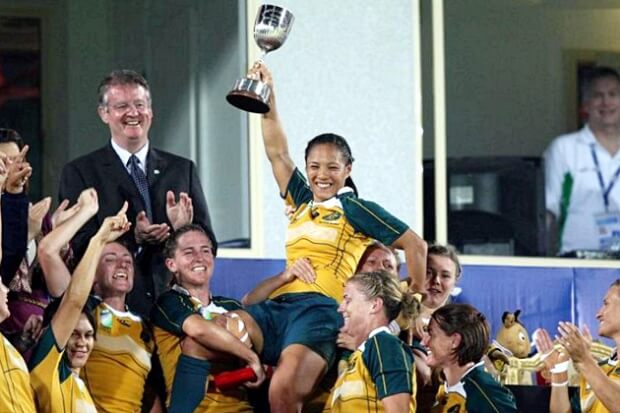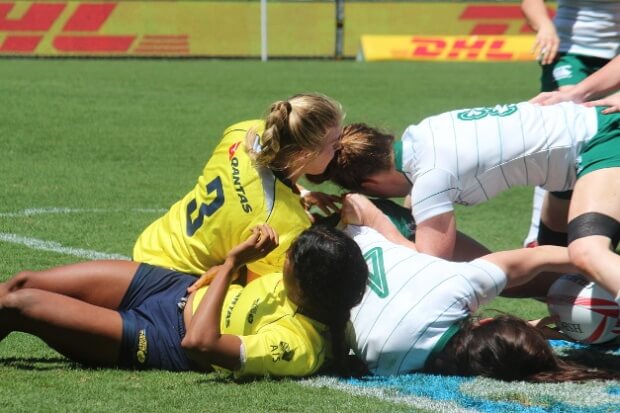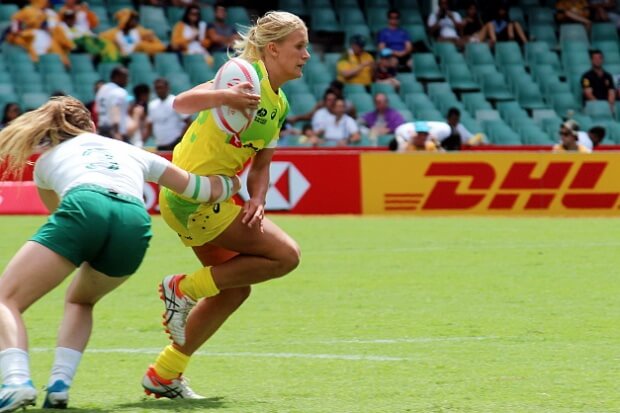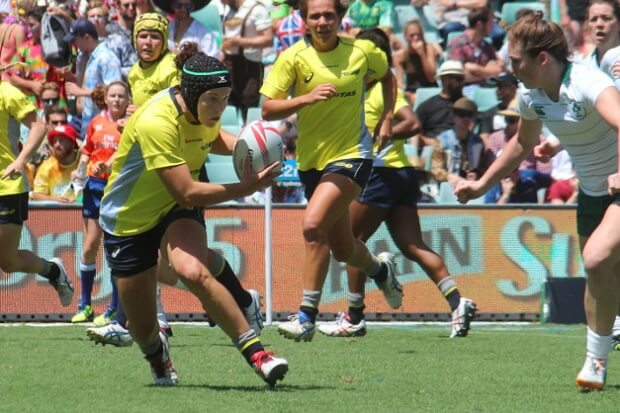The Aussie Women’s Sevens team is in cracking form after winning the only two tournaments of the 2015-16 HSBC World Sevens Series to date.
It makes them the bookies’ slight favourites to take the gold medal in Rio.
Women’s Sevens is one of the world’s fastest-growing team sports and as everybody knows: Rio will host the first rugby Sevens’ events in Olympic history.
It took too long for the blazers of the old International Rugby Board [IRB] to give the women respect.
The Hong Kong Sevens took the initiative in 1997 when they added a women’s tournament to the mens’ programme, but it took another twelve years for the IRB to get interested. That’s when they started up a women’s division of the 2009 Rugby Sevens World Cup in Dubai.

Change was in the air when they gave challenge rounds to the women during three of the men’s tournaments in 2011-12; they were a great success.
Based on that the IRB gave Women’s Sevens more respect when they organised a Women’s Series starting in 2012-13, albeit with a small number of tournaments compared to the men.
New Zealand deservedly won the three Series to date but Australia leads in the 2015-16 season after two emphatic stage victories. Their win in Dubai, where they came back to beat New Zealand in the quarter-finals, was impressive enough, but in Sao Paulo their defence was magnificent and they didn’t have a point put on them in the quarters, semis or final.
Although they won’t be counting too many chickens, nor looking at betting odds, it is a good sign that they have won two tournaments in a row for the first time, in an Olympic year.
The Aussie Pearls have used only 14 players in their two squads of twelve to date: two new players were required for Sao Paulo because Chloe Dalton broke her arm, and skipper Sharni Williams strained her knee ligaments, in Dubai.
Sharni Williams – inspirational leader, injured in Dubai
You’ve got to feel sorry for Aussie Women’s coach Tim Walsh. The men get ten tournaments in 2015-16 but the women only five. That means Walsh is limited to the number of fringe players he can have a look at in top competition prior to the Olympics, yet still give the regulars enough events to keep them at a high pitch.
Despite their stingy amount of Series’ fixtures the women have been kept busy at their camp in Narrabeen, even doing some non-contact drills with the men; but there is nothing like playing games.
With that in mind Walsh took the development players, with a couple of the senior women, to the Fiji Coral Coast Sevens in January. Later in the month some of the youngsters were allowed to break camp and represent teams in the aptly-named “World’s Hottest 7s” tournament in Darwin.

The biggest non-Series event was a “friendly” three-game challenge against the improving Ireland team, during the Men’s Sydney Sevens in February. They won all three matches scoring 13 tries to two and Walsh and his staff had a good look at some non-core players under the pressure of playing in front of a huge crowd
This was an eye-opener for Sydney-siders. They may have turned up to watch a fun men’s sporting event, but many left amazed by the skill, athletic ability and entertainment value of the women.
ARU Chief Executive Officer, Bill Pulver, loved it and said:
We’re in a dialogue with World Rugby right now to see if we can combine the men’s series with the women’s series and have an integrated tournament next year.
This will get the “thumbs up” from patrons who saw them play in Sydney. It will be similar to the three-day joint Men’s and Women’s World Series competition held in Dubai last December.
Pulver added that there was also the possibility of starting a women’s domestic Sevens series, to be staged in major Australian cities.

After the Sao Paulo stage recently Coach Walsh had a good look at their whole squad at Knox College in Sydney. They played New Zealand in six games over two days at certain times to duplicate the Olympic timetable.
Reports mentioned that they won a match when both teams used their top performers, but after both countries fielded non-core players in the other matches, the Kiwis finished with a 4-2 overall count.
There has been some second-guessing about what the correct preparation is for Rio, but Walsh is probably right on concentrating on winning the the HSBC Women’s Series first, regardless of the Olympics.
What better preparation could there be?
The conspicuous Jen Fisk
The Rio Rivals
Australia (40 points) has not been defeated in their twelve games this season. Next on the ladder are Canada and New Zealand (28 points), followed by France (26), England (24) and Russia (22).
Canada – With the Aussies, they have been the closest rivals to the Kiwis in the last two years and were second in 2014-15. They played the Pearls in the last two finals last season and won the last one in Amsterdam.
They stumbled in Dubai in the first event of the current Series but bounced back as finalists in Sao Paulo. With inspirational players such as the conspicuous Jen Kish, they will be a threat to all teams.
New Zealand – They have not been the force they were and, counting the end of 2014-15, they have not been in the last four finals. This season they won the Plate in the first stage and were third in the Cup in the second, which is small beer for them.
Like Australia they have used only 14 players in the two events but when Kayla McAlister gets up to speed after her lay-off before Sao Paulo, and combines with lethal finisher Portia Woodman, expect them to lift their performances.
Kiwi star Portia Woodman does the business at Sao Paulo 2015
The team
The Aussie Pearls are a young team with an average age of about 22 years, but some of the youngsters are experienced already and at the top of their game. There are older women also, who are mentors in more ways than one, which gives the side good balance.
There have been some outstanding 18-year-olds who have played in the friendlies mentioned before. Dom Du Toit and Shenae Ciesiolka were applauded by the Sydney crowd but missed selection for Sao Paulo to replace injured players who were not “like-for-like” with them.
These young ladies may not make the Aussie Olympic team this time but they are the stars of the future.
Australian Women’s Sevens have more premier players than the men do and, knowing that I am remiss in not naming others, here are five of them.
Shannon Parry – power player and a team leader
The fab five
Great mates Sharni Williams, the skipper, and Shannon Parry, could be talked about separately but there is no need to. They are both team leaders and power forwards who are strong at the breakdown and can shift with the ball.
Emilee Cherry is the class act of the team—if you had to name just one. The 23 year-old playmaker is a role model to younger players who want to be like her.
Cherry was the 2013/14 Women’s Sevens World Player of the Year and has a large kit bag of rugby skills which she uses in big moments. Walsh said of Emilee: “She is certainly one in a million”.
I wonder where the other 22 are?

Ellia Green is electrifying. The team personality leads the Series’ field with 15 tries in the bag after two tournaments. Though a former track sprinter she can step, but is more often seen flying down touch.
It is a brave tackler who gets between the try-line and the “Green Machine”.
Charlotte Caslick is in great form. She was one of the four candidates for 2015 World Sevens Player of the Year and in the last tournament was named in the Sao Paulo Dream team.
The 21-year-old is quick, creative, sharp and shrewd. Like all elite Sevens’ players she adds value to the players around her and makes them better than they are.
Charlotte Caslick with Ed Jenkins at the Olympic Uniform launch yesterday – both certainties for Rio, you think?
There are still three tournaments remaining in the HSBC Women’s Sevens Series for players to earn an Olympic spot—in the USA, Canada and France. But it will be difficult for anybody to displace a player chosen for the Dubai event nearly four months ago if everybody is fit.
An exception could be Tiana Penitani who played every match in the 2014-15 Series but was sidelined by a knee injury before Dubai.
Walsh will have the problem of whom to leave out.
Tim Walsh playing Sevens in Hong Kong 2002 – will have some tough choices as coach
Like the men, the Women’s Sevens have to finish their season well—they, to keep their gold medal form; them, to deserve a podium position and hope for more.
The women will be playing the weekend after next in their third tournament of the season in Atlanta, while the men will be in Hong Kong playing in their seventh.
If you don’t have enough time to view both, choose the women; you’d be more likely to be watching a 2016 Aussie gold medal team in action.
Like Sevens’rugby? Read Aussie Men’s Sevens on track for Rio
Photos by Lee Grant, unless credited otherwise.

